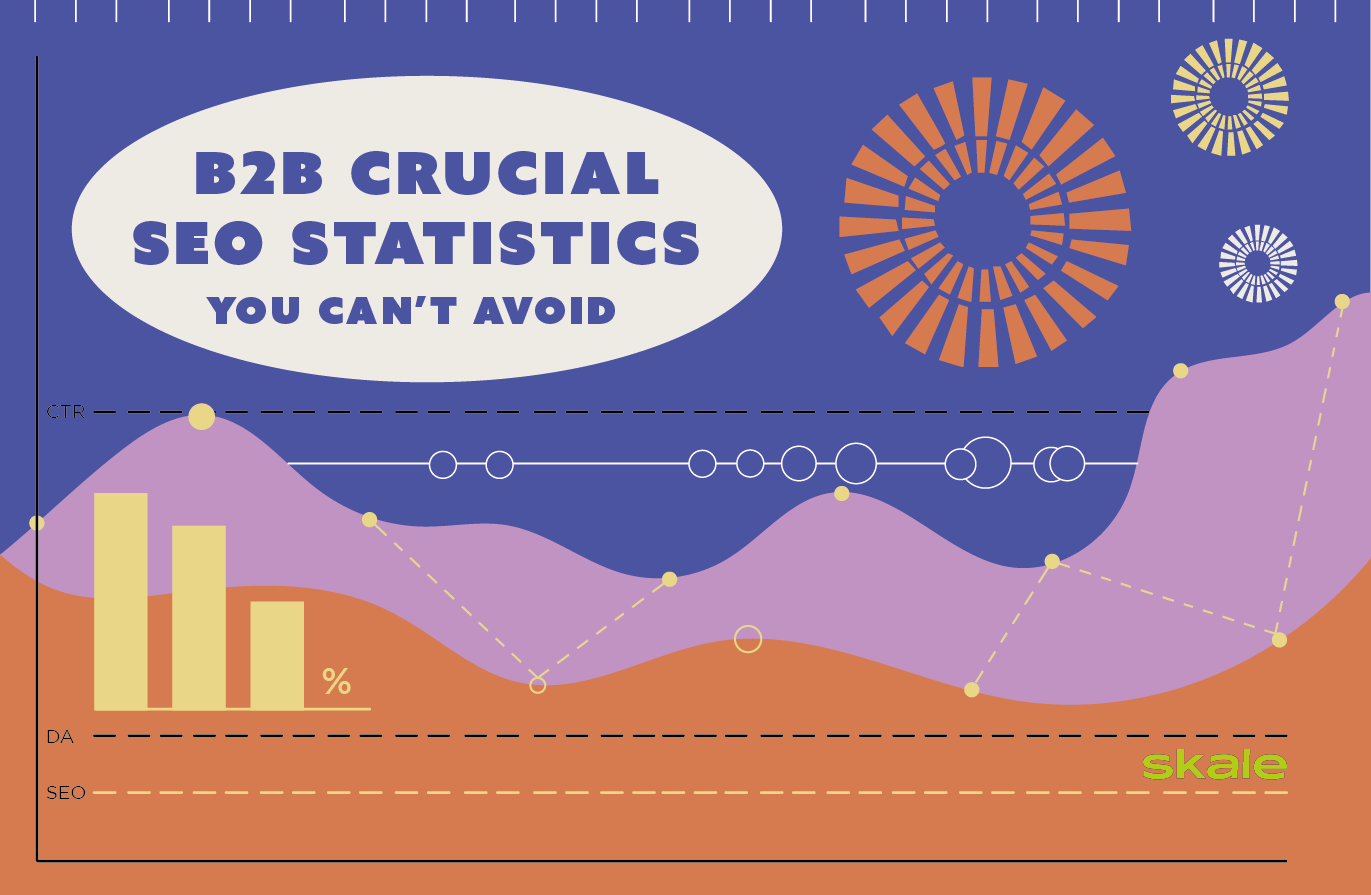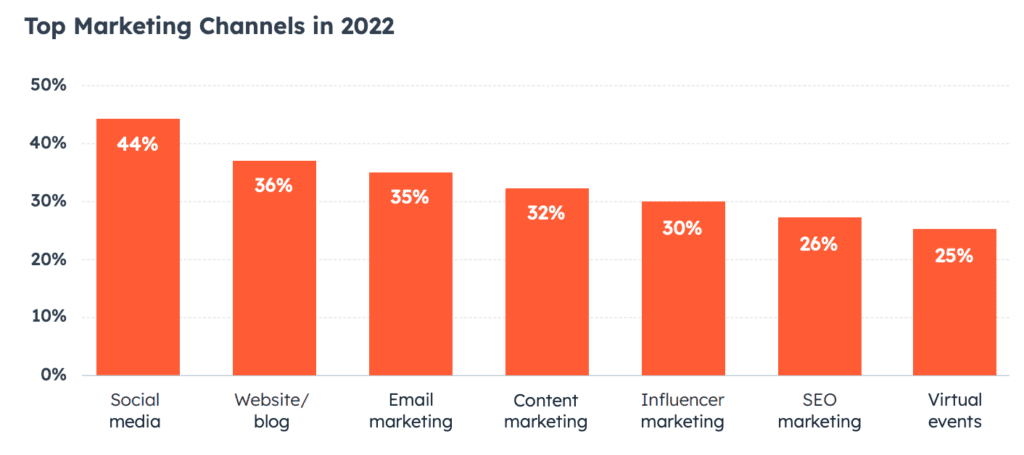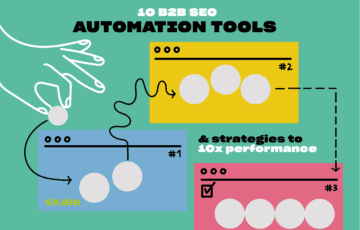
The Power of Partnership: 7 Benefits of Hiring a B2B SEO Agency
These benefits of hiring a B2B SEO agency illustrate why outsourcing your content can help you to drive new revenue for your business.


Leave your SEO to the experts
Up your game. Apply for full SEO Management with the Skale team
Contact UsSearch engine optimization statistics provide a benchmark against which to compare your SEO efforts and achievements. They also help CFOs and VPs see the possible impacts that their SEO team could have–and help them give them the budgets necessary as well as set realistic milestones for them. Additionally, understanding SEO statistics and their benchmarks can aid SEO teams when coming up with a strategy so they know where to spend more of their time and resources given where they are against those benchmarks.
They can also help guide you towards SEO trends and easier competitor analysis. Staying on top of industry trends and statistics is a key part of developing your B2B SEO strategy.
In this article, we’ve got 32 up-to-date statistics to help guide your SEO efforts. They’re from a wide variety of sources and studies within the SEO industry and provide a glimpse into the future of SEO.
Shall we?
Keeping up with SEO is a must for B2B SaaS brands to increase MRR and reach growth goals. Here’s our up-to-date list of SEO statistics and trends to watch out for in 2024.
SEO is here to stay. It’s a key tool in a marketing team’s arsenal, of both product-led and sales led models utilized by SaaS organizations.
The fast-paced nature of SEO—the way in which the industry pivots following an algorithm update—makes it essential to remain up-to-date.
This comes as no surprise—the tech revolution has changed the way we live and work. It’s essential for B2B brands to prioritize SEO in order to reach the largest audience possible.
Only 5% of searchers end up clicking through to the second search engine results page—appearing on the first page is a high priority for B2B brands.
It’s no surprise that many searchers end up clicking the first organic result. More and more people are automatically scrolling past the ads to find the number one organic result. There’s even a name for this behavior: banner blindness refers to the avoiding of promotional content. Banner blindness is the reason organic listings receive on average 20 times more clicks than paid ads.
That being said, CTR does also depend on the search engine results page feature in question. Take a look:
Google currently holds 92.5% of the global search engine market share, so it’s no surprise they’re the go-to search engine for 70% of desktop users.
Appearing at the top of Google search results is a top priority in many SEO strategies.
Your competitors are doing it, so why aren’t you? The online experience is going nowhere—businesses that fail to adapt to new SEOstrategies are destined to fail.
Most people arriving on your website do so through a search engine. Ensuring you’re ranking for the relevant keywords can have a huge impact on organic site visitors and MRR.
A robust SEO strategy is key for ensuring you’re building brand awareness and trust throughout the purchasing process. Businesses research the options available to them, meaning your SEO efforts need to be expansive and stable in order to continually capture the attention of buyers.
That’s in comparison with 44.6% on average for the industry vertical, and second only to the technology industry.
Earning customers is more effective than buying them—who would’ve thought? SEO involves optimizing your website to improve user experience and help with search engine rankings.
While PPC gets your brand in front of prospects, organic searches are 8.5 times more likely to get clicked than paid searches–however, PPC traffic converts 50% higher than organic traffic. So, although PPC is a great tactic to use, you don’t want to disregard the power of SEO and organic traffic.
Additionally, since SEO efforts translate to an improved experience for users, it’s still a requirement for every website to have a great SEO strategy.
Including SEO in your marketing budget is a cost-effective decision when ROI is high—likely due to the long-lasting effects of investing in SEO.

Effectively measure your SEO ROI today
Download your free ROI tracker and better support your SaaS SEO strategy
Download our AssetIt’s no longer just up to your sales team to sing your product’s praises. There’s a whole new way to attract customers to your brand.
Targeting the right keywords and optimizing your website for search engines is a key way of getting people interested in your offerings. A combination of SEO efforts—such as improved crawlability and proper indexing, as well as high-quality content—leads to increased organic traffic and more eyes on your product.
Let’s take a look at the stats.
SEO is so effective for generating leads that they’ll need their own name soon.
Keywords are still an important part of SEO—they indicate to search engines what your website is all about. You’ve got primary keywords, as well as secondary and tertiary keywords, and you’ve also got long tail keywords, which are usually 3-5 words and allow you to target specific demographics. For example, your primary keyword might be ‘wellness’ and your long tail keyword might be ‘financial wellness for pre-retirement employees’.
Long-tail keywords are usually phrases t related to the primary keyword, but which get less traffic and are therefore less competitive. Long-tail keywords can be a great way to reach your target audience—given you know which long-tail keywords to target.

Both social media and websites/blogs are self-serve options for brand discovery. Users don’t need to jump on a call or join a demo—they can consider your offerings in their own time usingtheir own research.
Content marketing is a key part of any SEO strategy—it enables you to position your organization as a thought leader. Keyword research is a prerequisite for developing a high-quality content marketing strategy.
We’ll talk more about content marketing in SEO shortly.
Creating quality content doesn’t render your sales team obsolete—it just means prospects are arriving with more info than before. Gone are the days when the sales team was the first point of contact—interested parties now have access to way more information.
Your sales team is now tasked with taking SQLs and securing the sale and business.
Investing in SEO reduces the long-term cost of customer acquisition. SEO is a long-term investment that continues to benefit your organization long after you cease investing in it.
That being said, SEO is a fast-changing field, and keeping up with new trends and developments is key for ensuring you continue ranking highly for your desired keywords.
Strategic, in this context, means SEO-optimized. Organizations can create optimized landing pages with conversion-orientated keywords. During keyword research, adequate keywords are allocated to each stage of the sales funnel, landing pages are optimized and, consequently, rank for the BoFu (bottom of the funnel) keywords
More and more searches are now done on mobile devices, particularly since Google’s introduction of mobile-first indexing, and designing a mobile-friendly website has become a priority. Website speed is a key factor in optimizing your website for SEO and user experience, and one that’ll continue to matter in the future from now on.
Content is a key part of SEO—so much so, that it now has its own name. Content marketing refers to how B2B brands use content to attract and retain customers.
Content is hugely important and has a number of benefits for your SEO efforts, such as:
It’s not as simple as it seems—your content needs to be high-quality, keyword research-informed, and quick to load. Poor content does little to support your SEO efforts.
Additionally, according to Google’s Quality Rater Guidelines, there are four things great content must have in order to successfully rank. Those are E.E.A.T.:
All this means is that Google–and readers–want content from an authority that has first-hand experience and the right knowledge about the subject at hand. Experience, Expertise, and Authoritativeness foster Trustworthiness in the site and brand. And at the end of the day trust is what really matters to both Google and readers.
Content marketing is a key tool in SEO—it’s no surprise that almost three quarters of B2B organizations are utilizing the benefits of a content marketing strategy. However, content marketing goes way beyond consistently posting blog posts. It’s about the quality of all the content (blog posts included) you’re creating for your brand as well as properly matching the user intent.
As SEO grows and more and more people are finding what they need via search engines, businesses are increasingly investing in content marketing. We only expect this trend to continue growing.
It’s possible that the remaining 67% of B2B companies are using their marketing spent on strategies like PPC, which, although can bring in results, increases Customer Acquisition Cost, whereas SEO decreases CAC over time and has incredible results–when done right.
Content comes in all shapes and sizes, and there’s unfortunately no single way to ensure your content does amazingly. Your best bet is to create high-quality content that stands out from the rest—whether that’s with stunning visuals, great infographics, or unique sections.
Standing out is becoming increasingly harder, and catching the attention of your audience requires more effort than before. Video content marketing has proved itself as more than a trend—consider how it fits into your overall marketing and SEO strategy.
Don’t leave it to the big dogs—there’s plenty of space to establish a strong content marketing strategy in your organization.
‘Do follow’ backlinks pass value between web pages. Backlinks are links from another site to your site, and they serve as a ‘vote of confidence’ from one webpage to another. The more relevant and quality ‘votes of confidence’ a page has, the higher domain authority they’re likely to be given.
This one’s a no-brainer—but 97% is still a shocking number. Creating quality content is great for winning backlinks as you’re providing something valuable for others to build on.
For example, say you secure an exclusive interview with a top B2B CEO and publish the conversation on your blog. This content is new in the industry, and it contains ample never-before-seen quotes and insights.
Other brands are sure to use the content from your interview, and best practice dictates that they include a backlink to your website. This can get you ‘do follow’ links that boost your domain authority and rankings.
Content marketing can be focused on a number of different end goals, and is commonly created through the lens of the marketing funnel. TOFU, MOFU, and BOFU content all have different intentions and results—so it’s important to create tailored content for each stage of the funnel.
B2B SaaS brands know the importance of tracking and measuring progress—SEO is no different.
When it comes to measuring the success of your SEO, there are some key metrics to consider:
These metrics can more or less be directly attributed to SEO, but there are other crucial marketing metrics that aren’t as easy to attribute to a single area. That doesn’t mean you shouldn’t track them—quite the opposite.
These metrics include:
Let’s take a look at some of the statistics surrounding SEO for B2B brands.
Keyword rankings and organic traffic are the top two ways marketers measure the success of their SEO strategies, followed by time spent on page, CTR, bounce rate, returning visitors, and domain authority.
These can be attributed to SEO efforts in a way that other metrics cannot.
However, these are not the metrics marketers should be focusing on when measuring their SEO performance. Since these metrics fail to relate SEO to the revenue which is what their leadership team cares about. As a result marketing teams focused on SEO get less budget than their PPC peers who are able to show ROI more effectively.
One way to attribute sales to SEO efforts is by keeping everything else the same. If you solely focus on SEO as a lead generation tool, you can more confidently attribute sales to your SEO efforts.
The metrics you track are up to you, but three to five metrics are a good place to start. It’s better to track fewer metrics very well than measure many poorly.
Using SEO tools to keep up with your efforts is a great way to measure their effectiveness. Popular SEO tools—such as Ahrefs, Moz, and more—enable you to track domain authority, CTR, bounce rate, and more.
Monitoring ranking drops and ranking increases helps identify tactics that are working—and those that aren’t.
SEO experts send frequent reports to clients, with around a quarter of experts surveyed sending weekly reports. This enables organizations to stay up-to-date with keywords and rankings, and gives an idea of how closely you should monitor your SEO efforts.
Having these statistics is only half the battle—you need to know how to use them, too.
Statistics and trends give you a guide to what’s happening in the industry right now, which enables you to adapt your strategy to match. For example, the above statistics highlight the benefits of content marketing for SEO—so, why not focus on creating quality content?
Statistics can also help you identify up-and-coming areas in SEO that could give you a headstart against competitors. SEO is a fast-evolving industry that often pivots due to search engine algorithm changes.
Finally, SEO statistics also give you an idea of what not to do. If others aren’t bothering, there’s likely a reason why. That being said, there’s no surefire way of ranking number one—just a set of best practices to help point you in the right direction.
Your brand is unique—as is your audience—and what works for you depends on your offerings and brand. While some content works for others, it may not work for you. Consider how best you can approach each area of SEO—whether that’s site load time, high-quality content, or an improved user experience.
A strong SEO strategy can help retain existing customers, attract new ones, and position you as an industry leader. Plus, you continue to reap the benefits of SEO long after you stop investing in it.
SEO is the key to long-term SaaS success—it gets you in front of your target audience.
Investing in SEO is one of the best decisions you can make for your business in 2022, and it’s not a process you have to undergo alone. Enlisting the help of a B2B SEO agency helps ensure you’re making data-driven decisions that help you reach your retention, acquisition, and conversion goals.
Get in touch with Skale today to find out how SEO can help your B2B business grow. Your competitors are already investing in SEO—what are you waiting for?

Level up your SEO strategy with Skale
See where Skale’s SEO experts can take your MRR. Get in touch, today
Contact UsSEO is highly relevant to B2B. SEO helps get your product in front of your target audience—enabling them to consider your solution for their needs.
When so many solutions are available in the B2B market, it’s essential that your product be a high-ranking result for your keywords.
SEO marketing is highly effective. SEO marketing can greatly impact your overall marketing efforts and leads to increased SERP ranking, retention, acquisition, and sales.
60% of B2B organizations make use of SEO marketing strategies, and that number is expected to grow. More and more businesses are investing in SEO to strengthen their domain authority and rank for relevant keywords.
Learn more about
B2B SEO

The Power of Partnership: 7 Benefits of Hiring a B2B SEO Agency
These benefits of hiring a B2B SEO agency illustrate why outsourcing your content can help you to drive new revenue for your business.

15 B2B Customer Acquisition Strategies that Increase Revenue
Want to find new customers who truly value your business? We’re here to help you out with a list of the top 15 B2B customer acquisition strategies.

10 B2B SEO Automation Tools & Strategies to 10x Performance in 2024
Save time with the right B2B SEO automation tools and strategies that are sure to bring your marketing to the next level–we've listed them here.